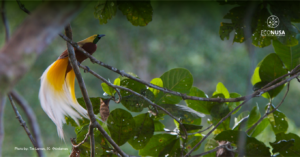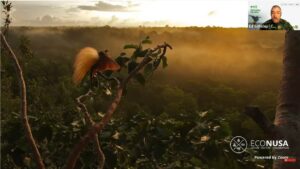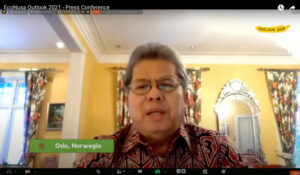
Tropical rain forests in Indonesia shrink over time. Not much forest is left in Sumatra and Kalimantan. Forests in the Land of Papua become the last bastion that we can hope for and preserve so as not to change functions. There, the highest biodiversity in the world is: more than 20,000 plant species, 602 bird species, 125 mammals and 223 reptiles.
Ecotourism is an alternative way that can be done to maintain the existence of forests in Indonesia. Utilization of environmental services through ecotourism keeps forests sustainable, stops illegal logging and poaching, while on the other hand the community receives financial benefits. Ecotourism provides answers to participatory forest management in which the community is directly involved.
This became the main discussion in Mari Story (MaCe) Papua titled Cenderawasih, Ecotourism and Management of Papua Forest who presented speakers Alex Waisimon (Ecotourism Management of Isio Hill), Adi Kristianto (Bird Observer and Nature Photographer), Edo Rakhman (Forest Group Coalition Coordinator) , Alosius Numberi (Associate Program of Natural Resources Management for the Papua Land Foundation EcoNusa). Present as the moderator was Andhyta F.Utami.
Alex stated that the key to ecotourism is to reap the benefits of the forest without damaging it. It also ensures that future generations can enjoy the opportunity to see the forest and biodiversity in it. This is reflected in the ecotourism practice of Bukit Isio (Isio Hill’s Bird Watching) birds managed by Alex in Rhepang Muaif Unurum Guay, Nimbokrang District, Jayapura Regency, Papua.
Alex managed to convince the people of ten tribes to make 98,000 hectares of land a protected forest and ecotourism. There are six species of paradise that tourists can enjoy there. In total, there are 84 species of birds from 31 families that live in the forest.
The idea was to make birdwatching spots successful in stopping illegal logging and hunting. Alex changed the perspective of hunting from weapons to cameras. “In accordance with the times, we have a new hunting, hunting a new way that is with ecotourism. They look and take pictures, “said Alex.
Bird watcher and nature photographer Ady Kristanto said the Land of Papua has hundreds of bird species and various endemic birds that must be protected. Ady said, bird watching ecotourism can be one way to enjoy while maintaining endemic bird habitat maintained.
However, the sustainability of ecotourism is challenged by various factors. In addition to land conversion, infrastructure development also threatens the loss of habitat for various endemic animals. Ady gave an example, the construction of the Waigeo outer ring road and the expansion of the airport threatened the loss of the habitat of red paradise (Paradisaea rubra).
“The nature reserve affected about 40-50 percent of the construction of the outer ring road. Airport expansion of around 10 percent of habitats near Saporkren Village has the potential to be lost, “said Ady.
Ecotourism management needs to be supported by various parties. This is necessary so that ecotourism and the forests within it receive the full attention of the community and government. The EcoNusa Foundation captures various initiatives from the community in sustainable resource management.
“Especially related to the practice of protecting the forest. Because Papua’s forests are tropical rain forests, Indonesia’s hope needs to be maintained. If the forest is maintained the community can live because of the forest. The best forest management is through environmental services, “said the EcoNusa Foundation’s Papua Land Natural Resources Management Associate Program, Alosius Numberi.
Alosius explained that the EcoNusa Foundation was accompanying ecotourism in the Yapen Islands Regency. There is Sarawandori Lake which can be used by travelers for selfies. Management of photo spots by the community keeps the forest around the lake maintained. “In the past the community used wood around the lake. But after knowing the benefits of selfies no longer cut down wood. The forest on the edge of the lake is guarded to get a panoramic background when taking pictures, “added Alosius.
For the people of Papua, forests are like mama’s that provide life across generations. The forest fulfills the community’s living needs from clothing, shelter to food. For this reason, joint efforts by various parties are needed to be able to protect the forest both in Papua and Indonesia.
Forest Group Coordinator Edo Rakhman stated that actually the wealth of the forest if preserved is far more valuable than being transferred. Forest areas in Indonesia today we must maintain to be a buffer zone for human life in the future. The combination of non-governmental organizations (NGOs) through the Forest Group invites the community, especially the younger generation, to have a concern for the forest. The young generation has strategic potential, ranging from determining Indonesian leaders to participating in the implementation of policies related to the environment.




